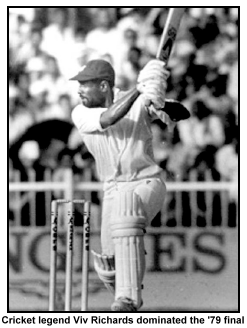
by KUSHAGRA BHATNAGAR
The ICC Cricket World Cup
began on Sunday, and as part
of the cricket fever that will
grip the sporting world over the
next month, badger sport is looking
back to past finals, starting in 1975.
At a time when cricket journalism
seems to resemble nothing more
than politics, it is refreshing to focus
again on the game itself.
One day cricket was beginning to
gain immense popularity when the
inaugural Prudential World Cup took
place in June 1975 in England. Already
a dominant force in the Test arena, the
West Indians stormed into the finals,
demolishing every opponent they
faced. Australia were the other finalists.
The stage was set at Lords, and
Australian skipper Ian Chappell won
the toss and promptly put West Indies
in. Clive Lloydís lightning-quick century
(102 of 82 balls) helped them post a
total of 291. The Australians succumbed
under the pressure of chasing
a stiff target, and eventually fell 17
runs short. Lloyd won the man of the
match award and received the Cup
from the President of the MCC, Prince
Phillip.
Four years later, the second
Prudential World Cup got underway
once again in England. The final was
played between West Indies and hosts
England at Lords. England captain
Mike Brearley won the toss and put
West Indies into bat.
 The match was evenly poised as
Viv Richards walked to the crease. He
destroyed the English attack by scoring
an unbeaten 138. In reply England
were bundled out for 194. The final
was marked by two stunning performances
- Viv Richardsí brutal display
with the bat and Joel Garnersí fast and
accurate bowling spell which carried
his side to victory.
The match was evenly poised as
Viv Richards walked to the crease. He
destroyed the English attack by scoring
an unbeaten 138. In reply England
were bundled out for 194. The final
was marked by two stunning performances
- Viv Richardsí brutal display
with the bat and Joel Garnersí fast and
accurate bowling spell which carried
his side to victory.
The West Indians confirmed their
domination once again as they lifted
the second successive World Cup.
Richards rightly earned the Man of the
Match award.
The 1983 World Cup final (in
England again) has been depicted as
one of the biggest upsets of the seven
World Cups played so far. On the
morning of June 25th
nobody gave India much
of a chance in the final
against West Indies. It was
a foregone conclusion.
Indeed, Englishmen who
had bought their tickets in
advance stood outside the
gates, hoping to sell them
to West Indian and Indian
supporters, for reduced
rates if need be.
The Indian team had
exceeded expectations in
making the final, but
was now facing a powerful
and experienced West
Indian team looking for its
third consecutive Cup.
Clive Lloyd won the toss
and opted to bowl. The
Indians were dismissed for
a paltry 183.
With no runs on the
board to play with, Indian skipper Kapil
Dev decided to attack. Amazingly West
Indies were shot out for 140. The
Indian bowler Amarnath had figures of
3-12, and was named the Man of the
Tournament as India shattered Lloydís
dream to lift the Prudential World Cup
of 1983.
The 1987 Reliance World Cup,
held in India and Pakistan, was the first
World Cup to be staged outside
England. 80,000 people filled Eden
Gardens to watch two old enemies
England and Australia contest the closest
World Cup final to date.
Australian skipper Alan Border
won the toss and wisely elected to bat
on a slow pitch. Australia scored 250
thanks to a canny innings of 75 by
opener David Boon. England were
cruising until English skipper Mike
Gatting got himself out playing the
reverse shot that he still regrets today.
It turned out to be the turning point
the match. Australiaís hour of glory
arrived as England fell agonisingly
short by seven runs. Alan Border lifted
the World Cup and David Boon was
awarded Man of the Tournament.
Next week continues the story
the cricket World Cup, beginning with
the 1991 tournament.
When this newspaper went
press, Englandís participation in the illfated
encounter with Zimbabwe
Harare, due to be played on the 13th,
was still to be finalised. It seems likely
that the ICC will still refuse to move
the match to South Africa, where the
ECB and the England players want the
match to be played.
Much has been made of the political
and financial implications of
Englandís possible withdrawal from
the match. From a cricketing perspective,
the loss of the four points could
be crucial, especially to a side as limited
as England.
This is illustrated by New Zealandís
current predicament. Having decided
to boycott the match against Kenya for
reasons of security, the Kiwis lost to Sri
Lanka on Monday and now face a stiff
task to qualify for the Super Sixes.
The inconsistency of the one-day
side meant England were always facing
a stiff task to do well at the World
Cup. The political chaos surrounding
their participation has made the task
little stiffer.

|
